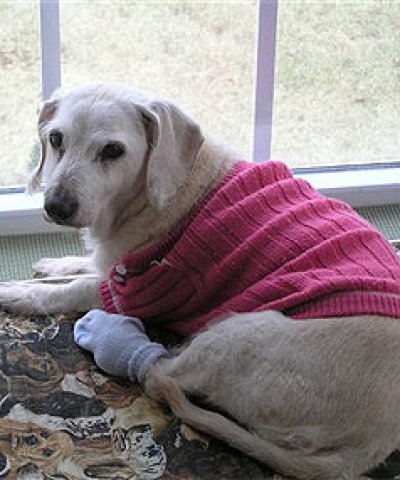What is hospice/Palliative care?
The term "hospice/Palliative care" can invoke many images, particularly if
you have had a family member or friend in human hospice care. For our
animal family members, it means addressing their quality of life until it is
time to say goodbye. This time can be a few hours or days in duration to
months or even years.
When no treatment will provide a cure, but comfort can be provided to
both the pet and family, Mobile Veterinary Service's hospice care may
be the best option. Like human hospice, pet hospice provides support
for the emotional, social, and spiritual needs of the whole family.
With pets, hospice recognizes that pets are a part of the family and
that everyone suffers when the most helpless of the family is in
discomfort and pain. In some instances, a diagnosis with a poor long term
prognosis does not mean the pet's quality of life is immediately
unacceptable. For example, a cat with chronic kidney disease may be
maintained comfortably for months or even years with proper care.
Unlike human medicine, decisions about pet care involve both the
tolerance of the pet to treatment as well as the inevitable concerns
about cost. For example, regardless of financial constraints, a
frightened cat might not be a candidate for cancer treatment that
required multiple vet visits because it could not travel in the car.
An elderly owner might not be able to afford surgery for her dog, but
could administer pain medicine at home.
We take a holistic approach to end of life care and try to meet the medical,
physical, and emotional needs of both the pet and the owner. This can
include:
Pain: Many geriatric patients of all species suffer from arthritis or pain from
neurological disease or cancer. A decline in mobility can make the
difference in whether the quality of life is acceptable or not. Fortunately,
many approaches are available to use to help manage pain in our patients,
including multi-modalities pain medications to keep an older pet feeling and
moving their best.
Nutrition: Animals in pain or who feel sick often do not wish to eat and an
pet's poor appetite is often cited by owners as part of the decision to
euthanize. Using both commercially available diets or a home prepared diet,
we can address the nutritional needs of the patient.
Medical Management: Many medical conditions that require professional
treatment can be addressed during a house call, such as administration of
fluids, medication, or nutrition via a feeding tube.
Psychological Management: We now know that animals can suffer from
many of the same signs of aging as humans. Many elderly dogs show signs
of canine cognitive dysfunction, which is similar to Alzheimer's disease in
humans. Signs include acting lost or confused, personality changes, urinary
or fecal incontinence or changes in housebreaking, sleep disturbances, or
even fear aggression. While these signs cannot be reversed at this time, some
supplements are suggested to be helpful in slowing its progression.



Appointment Hours:
Mon-Sun 9am -5pm
(After Hour Emergency Services Offered )
Phone:
(808) 383-2071
Email:
DVMWalter@Gmail.com
Service Areas:
Oahu, HI
Mon-Sun 9am -5pm
(After Hour Emergency Services Offered )
Phone:
(808) 383-2071
Email:
DVMWalter@Gmail.com
Service Areas:
Oahu, HI

